View from the Top
Managing partners Barbara Becker ’88 of Gibson, Dunn & Crutcher and Peter Furci ’95, LLM ’99 of Debevoise & Plimpton talk with Dean Troy McKenzie ’00 about succeeding and leading in the law.
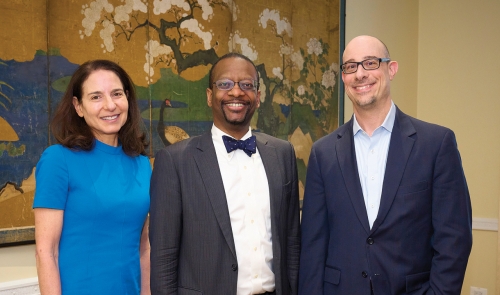
Barbara Becker ’88, Troy McKenzie ’00, and Peter Furci ’95, LLM ’99
What is it like to run the nation’s biggest and most prestigious law firms? Over the past few decades, the largest US firms have expanded to become billiondollar global businesses, many with thousands of employees, that handle cutting-edge transactions and bet-the-company litigation for clients that include the world’s largest companies.
In late May, Dean Troy McKenzie ’00 sat down with two NYU Law graduates at the pinnacle of big-firm practice to talk about their current jobs and their paths to getting there: Barbara Becker ’88, chair and managing partner of Gibson, Dunn & Crutcher (with more than 2,000 lawyers across 21 offices), and Peter Furci ’95, LLM ’99, presiding partner at Debevoise & Plimpton (900-plus lawyers in six countries). The conversation took place against a complex business and political landscape for law firms and their clients.
While Becker and Furci have reached rarified heights, their starting point—joining law firms immediately after getting their JDs—was one that remains common for NYU Law graduates. More than two-thirds of alumni begin their careers in private practice, typically at top-tier Am Law 100 firms, the largest in the country based on revenue. And many go on to become partners in a variety of practice areas.
Before becoming chair and managing partner in 2021, Becker was co-chair of Gibson Dunn’s Mergers and Acquisitions Practice Group for more than a decade and created and led the firmwide Diversity Committee. She serves on the executive committee of NYU Law’s Board of Trustees and is an inaugural member of the advisory board for the Law School’s Birnbaum Women’s Leadership Center.
As a JD student, Furci was a member of the Tax Law Review, and he currently teaches tax as an adjunct professor at NYU Law. At Debevoise, Furci developed a specialty in tax and private equity, with a significant international dimension to his practice. He was co-chair of Debevoise’s tax practice before being named presiding partner in 2022.
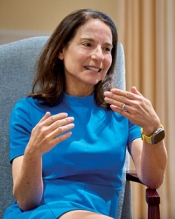
Troy McKenzie: What made NYU Law distinctive when you were a student? And now that you are hiring law students, what do you think makes NYU distinctive today?
Peter Furci: One thing that’s obviously great about it is that we are just in the heart of it. There’s a certain energy about the place because of where it’s located that I think is translated to the energy of the students.
I think we find that the students that come out of NYU tend to be a bit more suited for the rigors and the pressures of Big Law than other schools. These are people who want to be in the center of it, which is great.
Barbara Becker: We see so many students who are attracted to NYU Law at least in part because of the focus on public interest and, of course, who have that ambition Peter talked about. And then I think being in the heart of the Village attracts people who want to be in New York postgrad.
Furci: There’s no cutting pages out of books at NYU. I appreciated that as a student, and I appreciate it with the students we hire today.
McKenzie: What makes a standout associate?
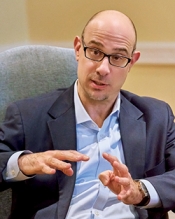
Furci: I don’t think that’s changed very much, honestly. Desire and vision, collegiality, intellectual curiosity, self-motivation, discipline, empathy, willingness to give credit to others—those are the traits we’ve always looked for.
Becker: I agree. Saying “yes.” Saying “yes” to opportunity. Saying, “How can I help?” Being proactive, being entrepreneurial, being organized. We pride ourselves on delivering excellence in all that we do. So if you’re a first-year associate on a project who is reviewing documents, taking that extra time to think, “Why am I doing this?” and “How does this fit into the whole?” Seeing the full picture and how your project fits in can have a huge impact on the final product and the part you play on the team.
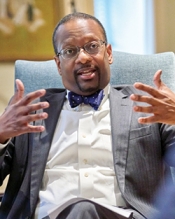
McKenzie: Peter, can you talk about why Debevoise has maintained a lockstep partner compensation system that is essentially unique among major firms?
Furci: We never proselytize on this issue. I think law firms can be very successful with a pretty wide range of governance and compensation structures, and a firm has to have a system that is right for its group of people and what they believe in and what they actually want to drive toward as a client-service organization. We did just vote to add a nonequity tier to our partnership, as a tool to attract and retain talent. For example, to recruit lawyers who might not join us without a partner title, or to build out certain capabilities that we might not be able to do with a single-tier structure. But simultaneous with that vote, we also reaffirmed our commitment to our lockstep system.
I think people value the collaboration that comes with lockstep, the feeling that every client is an institutional client, that there’s a lot of teamwork associated with [lockstep] and you’re not fighting with each other about compensation. You’re saying, I could make more money potentially somewhere else and I’m choosing this different working environment because of its intangible benefits. What I think our partners like about it is that it holds onto the notion that we are still a profession—even though we clearly are also a business—but we’re a profession still.
McKenzie: Barbara, you are still one of the very few female managing partners of a major law firm. How have you navigated that in your career, and do you have reflections on that continued reality even today?
Becker: I think about it in the context of how it can inspire other people when they see me in this seat. I received an email when I was elected from one of our Singapore nighttime copy center folks saying, “I showed the announcement to my daughter,” and that made me realize the impact this role can have. Seeing ourselves reflected in leadership positions is so important.
McKenzie: How do you think about acquiring and teaching leadership skills?
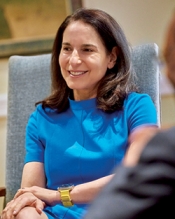
Becker: Leadership is a big word, but I think if you boil it down to what we’re talking about, it is organization, communication, authenticity, and empathy—
McKenzie: Human-scale things.
Becker: Human things that everybody can do in some way, shape, or form and that every lawyer needs to do at a law firm, whether it’s leading a team of associates or paralegals at the very junior levels, or leading a client through how to look at an agreement. All of those skills build and then just are expanded upon in roles like ours where we’re leading large organizations.
Furci: I think Barbara hit the nail on the head. The important thing to remember is that law firm managing partners are not corporate CEOs. We’re not hired to come in because we have a vision that we articulate of where things need to be and a topdown directive [such] that everything goes in that direction and if you don’t like it, you’re out. That’s not the nature of our job. We’re leading peers who are invested in the enterprise because they happen to own it and are very opinionated and—
McKenzie: And smart.
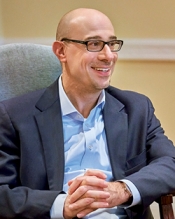
Furci: And smart and critical thinkers and they will let you know when they disagree with something, and therefore you actually have to be above all things a great listener, empathetic, and you have to build consensus. We don’t give orders, we build consensus, and therefore our stock in trade is reliability, trust, good listening skills, kindness, coupled with firmness and maintaining some values that are not negotiable.
McKenzie: Sounds like being a law school dean. Can you describe what a typical day is like for you?
Furci: I’ll just say this: whatever I think my day is going to be when I come in, it won’t be that. There’s a lot of reactivity, because you are still in a highly responsive profession where clients and people need resolution of things to make decisions, and sometimes those things are very time sensitive. Conflict-of-interest questions, in particular, tend to bubble up. But I do always try to carve out some time for long-term, positive-agenda items that you want to move forward. My predecessor warned me about this. He said, “If all you do is react to the crises, you’ll never do those things.” And that was, I think, really good advice.
Becker: There is no such thing as a typical day! I am an early riser, and like working across time zones to maximize connection with colleagues across the globe. But as to the specifics, every day is different. I love that.
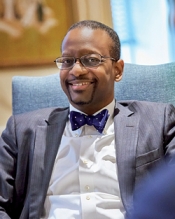
McKenzie: Let’s turn to the current environment. How have you been preparing or thinking about living in a world of increased economic and political uncertainty?
Furci: So, let’s divide it up into two components. One is the economic uncertainty. I think that no matter how much people intellectually understand that economic volatility can have an impact on activity levels, we as lawyers are naturally very nervous people, and if there are fluctuations in activity levels, people need to be reassured and reminded that we as an institution have navigated those issues before, and it’s going to be OK, that this is a natural element of what we go through as businesses that are correlated to the overall economy. But you have to get that message out there, you actually have to be engaged with people and remind them that it’s all going to be OK.
I think it’s a little bit harder to get the “it’s all going to be OK” message out on some of the other elements that we’ve been living with in the profession over the past couple of months. And all I will say on that is I think it is very important for the profession not to get too shaken up by what’s happened, and to remind ourselves that we have a mission, we have clients who need us, both paying and pro bono clients, we have to be there for them. We have to not lose our nerve, and we need to do the right thing for them. And I think that in a time where there’s just a lot of nervousness and panic and outrage on things, it’s an important part of our jobs to try to keep people focused on the ethical responsibilities that we have to the people who depend on us.
Becker: I agree. We have lived through economic cycles over the years, and one of the great strengths of being at firms like ours is the balance we maintain between transactional and litigation practices, as well as our geographic diversity. From a firm perspective, it’s important that our colleagues and clients understand that we are well positioned—not just for the current environment, but for a broad range of economic conditions.
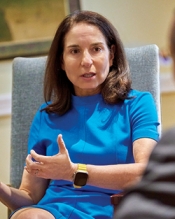
Equally important is staying true to our values. That includes our ongoing commitment to diversity and inclusion and to the pro bono work that’s been a cornerstone of who we are. On the D&I front, we remain steadfast in our commitment to fostering an inclusive culture where everyone has the opportunity to thrive.
And when it comes to pro bono, we’ve worked hard to build a robust platform in serving the communities where we work and live, and we’re proud to support the wide range of cases and causes our lawyers care about. That work spans a broad spectrum of issues and causes, and the depth and reach of our pro bono efforts continue to be something we’re incredibly proud of.
McKenzie: What’s your view on the pressure that’s being put on institutions to disavow diversity initiatives? How do you think institutions should respond to it?
Furci: This is a challenging issue, and we are advising a range of clients on how to handle it. There are usually multiple ways of achieving progress. If one way of advancing your goals is closed off, come back to the overall goal and think creatively. Sometimes the best progress can be made just by listening to people and understanding their perspectives, and the best solutions are often the ones that improve everyone’s experience.
McKenzie: If you were advising a law student right now, what would you say about building a career in the profession today?
Becker: The impact you can have throughout your career, starting from day one, is real. This is very much a profession where you can create your own path. And there are certainly things that can help along the way: find mentors and sponsors early on who take an interest in you; do great work; say “yes” whenever possible, even if it’s a stretch, and even if it’s not in the perfectly tailored zone that you’re looking to work in, but something a bit adjacent—you never know what kinds of wonderful opportunities might come from those experiences!
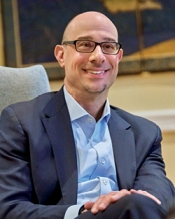
Furci: The question of what advice would you give a law student has become pretty real for me. I have a daughter who’s just finished her 1L year. What I said to her is what I say basically to our new associates: look in the mirror and tell yourself, “I am a professional.” Look sharp, be prepared to come in and say, “I’m not just smart, I’m not just academically good at this subject matter, I’m a professional, and I’m a problem solver, and I’m going to do what it takes to solve those problems today.” Pep talk yourself up a little bit, and have the mindset and the persona and the role that goes with being a professional. I think that’s super important.
McKenzie: If part of the key to success at firms like yours is saying “yes” as much as possible when you are asked to take on assignments, how can you do that and maintain work-life balance? How can you both draw the lines needed to achieve that balance and become partner?
Becker: Setting personal rules can help—for example, when my children were younger, I tried to always get home for family dinner and get back online later as needed. When I traveled, I tried to shorten my business trips as much as possible and I would choose to take red-eye flights home so I could be there in the mornings when the kids woke up. While it may not always be possible to follow your rules perfectly—and they will evolve along the way— maintaining discipline to control what you can and organizing your work around what matters most to you is essential.
Furci: I think you have to look at work-life benefit over a long period of time. At any given point, especially earlier in your career, things will seem off-balance. Using downtime wisely, planning for family and friend time, and relying on colleagues—and returning the favor—are the way. Simple, but not easy.
McKenzie: Choosing one path over another in life typically involves trade-offs. What trade-offs have you faced in pursuing the upper echelons of law firm practice and management?
Becker: While I have not typically framed my journey in terms of trade-offs, I have found that it is more about being open to opportunities as they have come along, even the unexpected ones. This goes back to my approach and advice in coming from a place of “yes.” For instance, I was perfectly content as an M&A partner, and being elected chair and managing partner of Gibson Dunn was not a role I had envisioned for myself. But when the selection process began, I was humbled and energized by the extraordinary support I received from the partnership. It made me pause and seriously consider how I could contribute in a new way.
Taking on this role meant shifting away, in part, from day-to- day client work, but it also opened the door to shaping the future of the firm and supporting colleagues and clients alike in a different, meaningful way
McKenzie: Law practice can be very sedentary and desk-bound. What do you do to stay active?
Becker: As I mentioned, I am an early riser, and I like to make sure I have time to exercise every morning, even if really, really early! Right now, I am in a Peloton phase, but over the years I have had different phases—running, yoga, etc.
Furci: For me, staying active is incredibly important, as much for mental health as physical. I lift weights every week, because the research shows that maintaining strength as you age is a primary marker of quality of life. During the pandemic, I started mixed martial arts training, which I love. Finally, a few years ago, I got a standing desk, which has helped a lot.
This interview has been condensed and edited.

